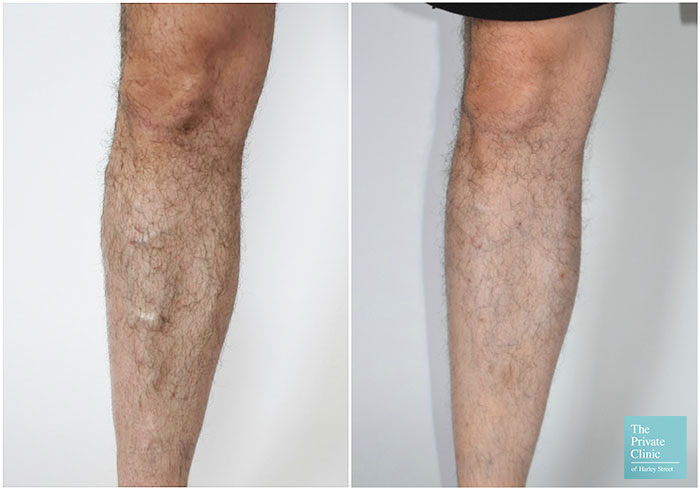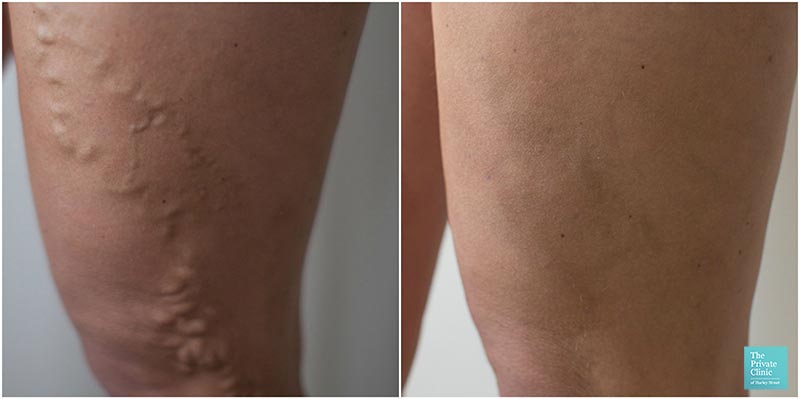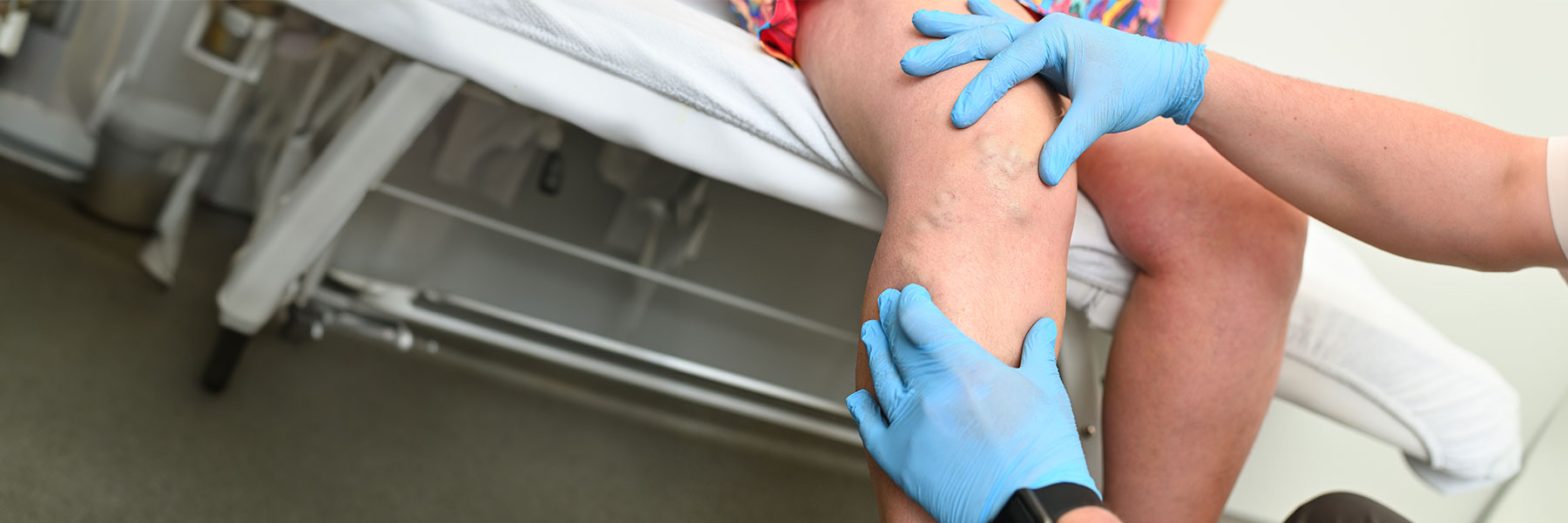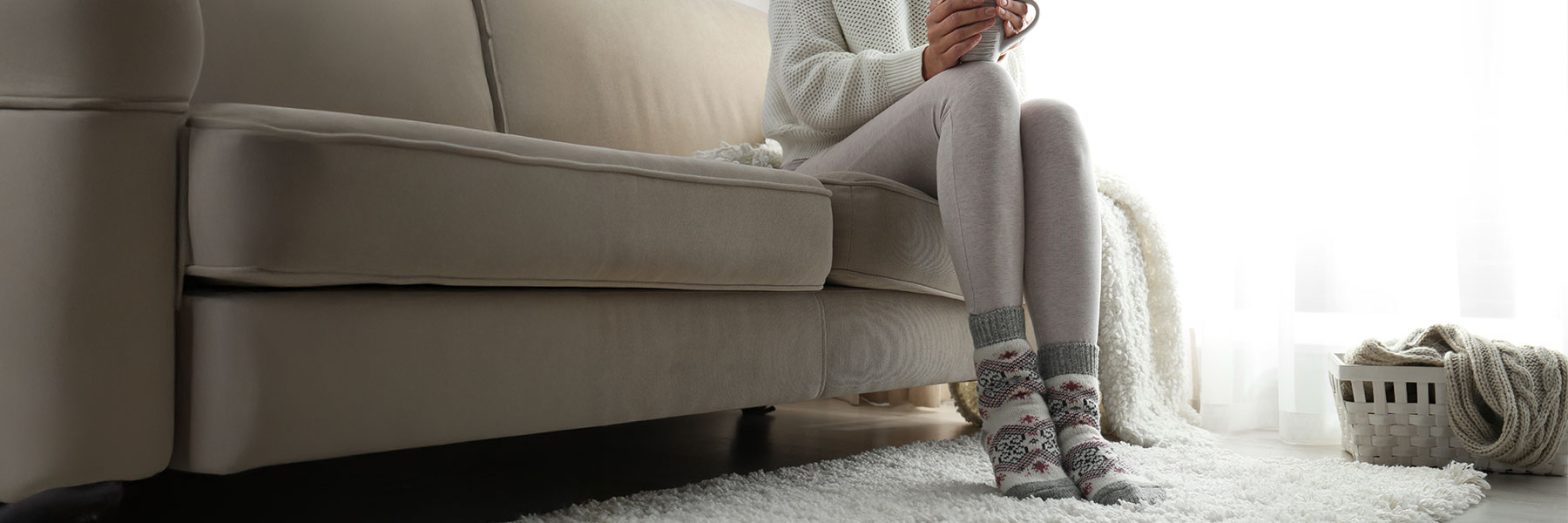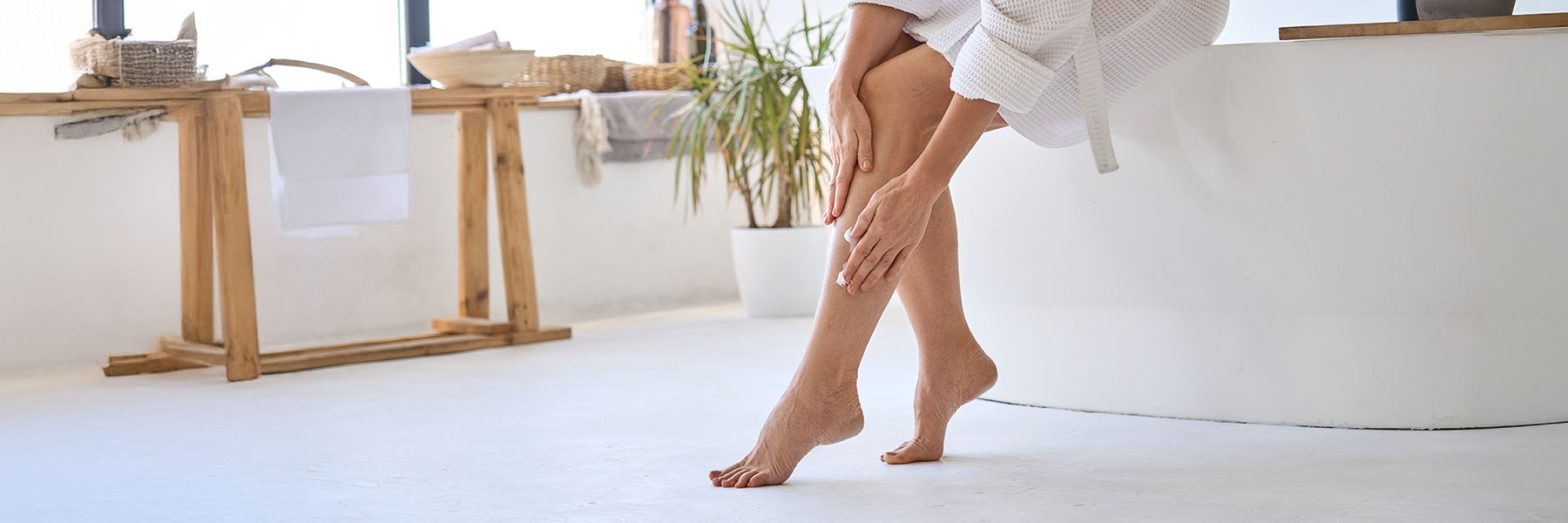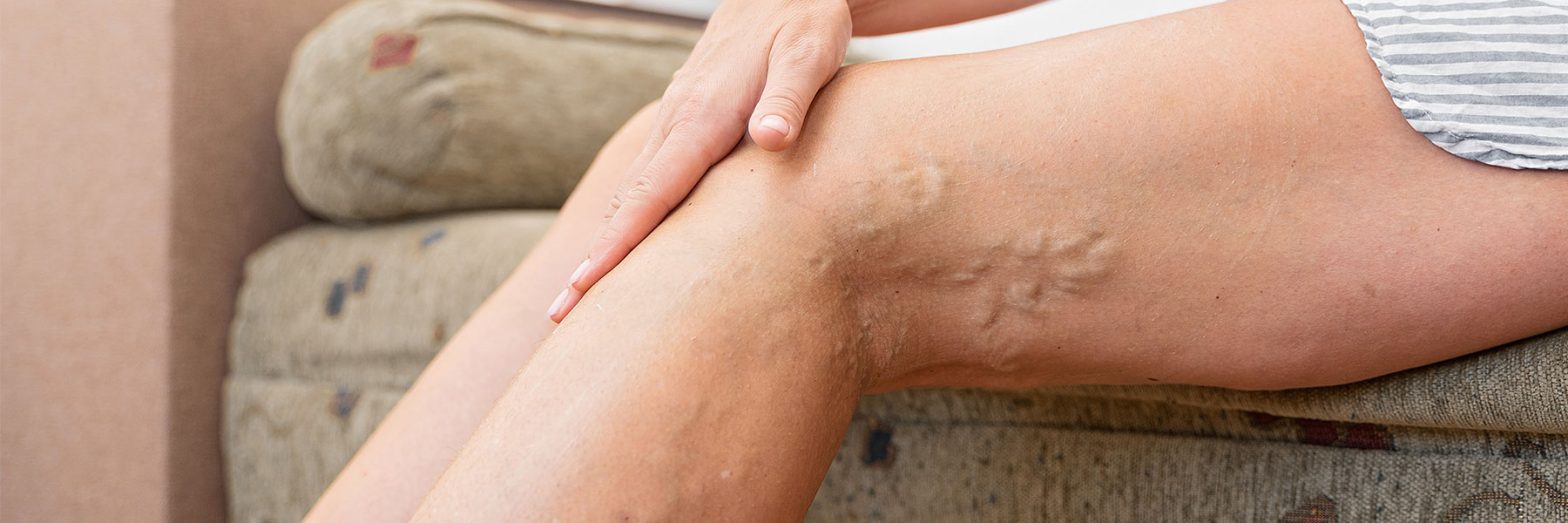Varicose Veins Top 7 FAQs
VARICOSE VEINS
Varicose Vein FAQS
When it comes to researching varicose veins and the treatments associated with them it can be quite confusing to know what is best for you. We would always recommend coming in for a consultation to get the best advice before deciding on your procedure but we like our patients to be as informed as possible which is why we have put together some varicose vein FAQS (frequently asked questions) to help you.
What are Varicose Veins?
Varicose veins are veins that are most commonly found on the legs. They have a bulging appearance and often sit raised above the skin. They are usually deep blue or even red in colour. Varicose veins are caused when there is a failure of the valves within the veins stopping them from working efficiently.
If you have Varicose Veins you will have most likely already noticed them but other symptoms like itching, heaviness and aching can be present too.
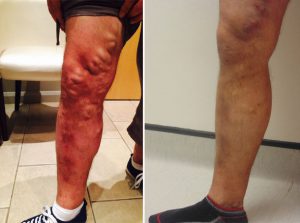
Why do varicose veins appear?
Veins help transport blood towards our heart. This requires the blood to flow upwards, against gravity, with the assistance of a series of muscle contractions. One-way valves act as one-way flaps preventing the blood from flowing backward. Sometimes, these valves can weaken or break, or fail to close properly. This causes our blood to be transported back to the legs. The backed-up blood results in the veins gradually bulging, and the appearance of varicose veins. These damaged veins have no purpose, so it is completely safe for them to be removed.
Approximately one fifth of us will experience varicose veins, and women are more prone to the condition than men. Risk factors for developing varicose veins include gender, age, obesity, genetics, and pregnancy.
When should I treat my Varicose Veins?
The progression of Varicose Veins is normally slow. Whilst there may not be an immediate need to get them treated, the sooner you have the treatment the longer you will be able to take advantage of the benefits.
A popular time to have varicose veins treated is during the autumn/winter months. This is often because it allows you to recover fully, ready to reveal your new legs by the summer.
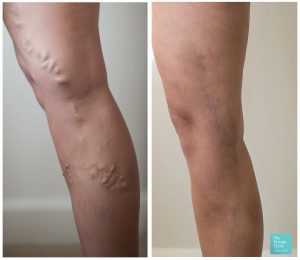
What does a varicose vein consultation involve?
At The Private Clinic, a consultation for varicose veins will be with an expert vascular consultant surgeon. You can also see one of our knowledgeable patient advisors first to get more general information.
Your consultation will begin with an initial conversation about why you have chosen to have treatment and what your desired outcome is. Your vein surgeon will go through your medical history, the risks and benefits, and may ask you questions about your lifestyle as this will determine your treatment options. They will then need to examine your varicose veins by performing an ultrasound of your legs. The ultrasound scan will check all the veins in your legs. This helps your surgeon to understand what the underlying cause of your varicose veins is. The results of the scan will then be discussed with you and the appropriate treatment plan will be suggested.
At this point you will be able to ask questions about the suggested treatments and your surgeon will discuss your treatment plan.
You will then meet with your surgeon’s patient advisor. They will give you a quote for the treatment/s suggested by your surgeon and answer any further questions you may have. At this point, you will be able to go away and think about your treatment options. You will then be able to book in for treatment and your patient advisor will be able to suggest suitable dates for this.
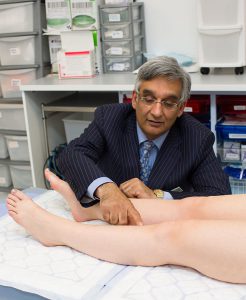
What is a good treatment for the removal of varicose veins?
There are several options for varicose vein treatment. It will depend upon your individual requirements as to what treatment is appropriate for you.
NICE (National Institute for Clinic Excellence) recommends that endothermal ablation, Endovenous Laser Treatment (EVLA), or Radiofrequency Ablation (RFA) should first of all be offered to varicose vein patients. EVLA and RFA treatments are regarded by NICE as the Gold Standard varicose vein treatment. NICE then advises that patients unsuitable for such procedures should be offered Foam Sclerotherapy, and if again unsuitable, surgery should be provided.
In some cases, you may not be suitable for EVLA or RFA. Instead, VenaSeal, Foam Sclerotherapy treatment may be suggested. Foam Sclerotherapy is best suited for smaller veins or Phlebectomy as a treatment for larger bulging veins. VenaSeal is another great treatment for patients who may have needle phobia or are looking for something with a quick recovery time.
At The Private Clinic, we do not offer vein stripping procedures. This method is not recommended by NICE and requires a long recovery period. The results are also not as effective as the current treatments we offer.
What does varicose vein treatment involve?
| Vein Treatment | What’s involved in a vein treatment? |
| EVLA (Endovenous Laser Ablation) | The damaged vein is located with the use of ultrasound technology, a laser fibre is inserted into the vein via a catheter and the vein wall is collapsed using laser heat. |
| RFA (Radiofrequency Ablation) | A tiny catheter tube is inserted into the targeted vein. Radiofrequency thermal heat energy is then used under ultrasound guidance to shrink and close off the affected varicose veins. |
| Foam Sclerotherapy | A chemical solution is injected into your varicose veins. This damages the vein and causes it to close off and the vein will gradually shrink, then disappear. |
| Phlebectomy | Small incisions are made, and a hook is inserted within the incision. This hooks onto a part of the vein and it is then removed. |
| VenaSeal | The leg is numbed prior to the insertion of a small catheter. An ultrasound guides the catheter through the varicose vein, and the catheter dispenses small measures of medical grade glue, which closes the vein. |
What doctor do you visit for varicose vein removal?
With more minimally invasive varicose vein procedures now being available, clinics are able to offer a variety of practitioners for varicose vein treatments, such as nurse practitioners, physician assistants, ultrasound technologists and doctors.
To ensure you will achieve the best possible results and care, we recommend you only select an experienced consultant vascular surgeon for any varicose vein procedures. They are highly trained in diagnosing and managing varicose veins. At The Private Clinic, we have Consultant Vascular Surgeons with extensive experience in treating varicose veins.
Is there an age limit to having your Varicose Veins treated?
There is no age limit to having your Varicose Veins treated as long as you are fit and healthy. At your consultation, your surgeon will go through your medical history to determine your suitability for the varicose vein removal procedures.
Is there a limit on how many varicose veins can be treated in one session?
There is no limit on the amount that can be treated in one session however we like to consider patients’ comfort.
All of our Varicose vein removal treatments are performed under local anaesthetic. This means that the amount that can be treated in one session is limited. In most cases, all veins are treated in one session. If your surgeon feels you may need two, then this will be discussed at your consultation.
If you have varicose veins on both legs then we would recommend having your legs treated on two separate sessions. This allows you to be more comfortable during your recovery time and have more mobility too. In some cases, you will need a follow-up treatment but this often won’t be decided until your follow-up consultation after your procedure.
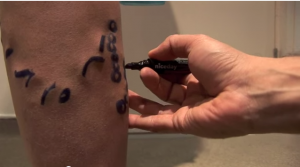
When my varicose veins are removed, how does the blood continue to circulate in that leg?
There are two types of veins in your leg; superficial veins and deep veins. Deep veins carry your blood back to your heart supported by the squeezing of your muscles that occurs during movements like walking. Superficial veins lay closer to the surface of the skin and are not supported by the leg muscles which means the blood within these veins is not forced towards the heart like the blood within deep veins. The blood that flows through superficial veins is often diverted into deep veins through the connecting veins valves.
Varicose veins only affect superficial veins, so once these veins are destroyed and removed from your leg your blood will be able to travel back into your deep veins and up towards the heart as normal.
If you have any additional questions about Varicose Veins and the treatments we offer please don’t hesitate to get in contact.
What happens when a varicose vein ruptures?
Varicose veins can be susceptible to spontaneous rupture or bleeding. The veins most at risk are those closest to the skin surface. What causes the vein to rupture?
With time, varicose veins increase in size, and their walls gradually weaken and stretch out. The veins are very weak and under high pressure, due to the pooling and ‘backflow’ of blood within them. This can lead to the veins bursting spontaneously and bleeding significantly. As they are under high pressure, the bleeding is profuse and rapid and difficult to stop. Whilst this is painless, this is a big nuisance and can be problematic.
Immediately after a vein rupture, the patient must lie down and elevate the leg and apply direct pressure on the area. If this does not stop bleeding, you must get immediate medical advice.
What can prevent rupture? Varicose vein removal in the first place can prevent vein rupture from occurring. If you have experienced vein rupture, treatment will prevent this from happening again. The problem will additionally only become worse if not treated. As well as spontaneous bursting, bleeding varicose veins can arise after minimal trauma. The injury would not need to be severe, a gentle knock or brushing against a furniture corner may cause this.
Are varicose veins harmful?
For many with the condition, varicose veins are only a cosmetic problem. Although, complications from varicose veins often arise several years following the veins’ appearance.
Having untreated varicose veins can put you at risk of developing ulcers, blood clots, spontaneous rupture, venous disease, and hyperpigmentation. A recent study by The Journal of American Medical Association also found that adults with varicose veins were at a significantly higher risk of having deep vein thrombosis.
In addition to such complications, Varicose veins can also cause several painful symptoms. These include swelling, aching, leg fatigue, cramping, itching, and heaviness.
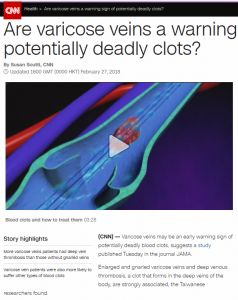
Varicose Vein Treatment at The Private Clinic
Here at The Private Clinic we offer competitively priced walk-in walk-out varicose vein procedures that are performed by some of the Country’s Top Consultant Vascular Surgeons. Our surgeons have also performed among the highest number of EVLA and RFA treatments in the UK, and have helped develop the procedure into the safe and highly recommended method it is today.
“I, personally, am over the moon…I have my confidence back and that feels fantastic.” – EVLA patient, Laura

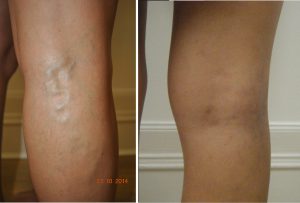
On our website, read all about our patient, Laura’s, varicose vein treatment story.
Why choose The Private Varicose Vein Clinic:
- The least invasive method for varicose veins and thread veins removal treatments for your legs, body and face.
- Our Consultant vascular surgeons are pioneers in EVLA(Endovenous Laser Ablation) and have treated thousands of patients.
- No lengthy downtime or recovery required.
- The NICE (National Institute for Clinical Excellence) Gold Standard for treatment of Varicose Veins findings shows that the success rate after five years for EVLA is 95.4%.
- A consultation with one of our Consultant Vascular Surgeons costs £200, including a free ultrasound scan of your legs (usually priced between £350 and £450 at most clinics and private hospitals).
- We work with our partnered finance provider ‘Chrysalis Finance’ to offer 0% finance* to our patients. Get in touch to find out more.
- We focus on the underlying cause of your veins and you will only see a Consultant Vascular surgeon for varicose veins.
- We have treated thousands of patients who have regained their confidence whilst avoiding health issues.
- Treatment takes one hour, you can go home shortly after being treated.
- Owing to our success, we have been featured in Harper’s Bazaar’s Cosmetic Tweakment Trends.
- We have carried out over 7,000 procedures in treating Veins.
Helpful Links
- See our varicose vein before and after photos.
- Read our extensive varicose vein FAQs
- Take a look at our varicose vein patient stories.
- Find out more information in our varicose vein blogs.
- Download our varicose veins brochure.
Varicose vein consultations are available at our clinics nationwide: London Harley Street, Birmingham, Manchester, Leeds, Bournemouth, and Northampton with our expert vascular surgeons.
Expert Vascular Surgeons
- Mr Constantinos Kyriakides, MD, FRCS (Gen), FRCS (Gen Surg). GMC Number: 3275436
- Mr Dynesh Rittoo, MBChB, FRCS (Eng), FRCS (Gen Surg). GMC Number: 3556456
- Mr Rajiv Pathak, MBBS, MS, FRCS (Gen), FRCS. GMC Number: 4585309
- Mr Tahir Hussain, MBBS, FRCS (Gen, Surg.), MS Masters in Surgery. GMC Number: 3242669
Get in touch
To find out more about our varicose vein treatments or to book a consultation please call, 0333 920 2471 or use our varicose vein online contact form.





